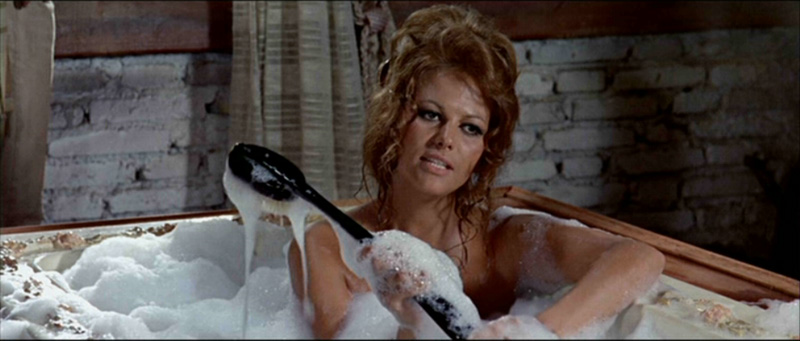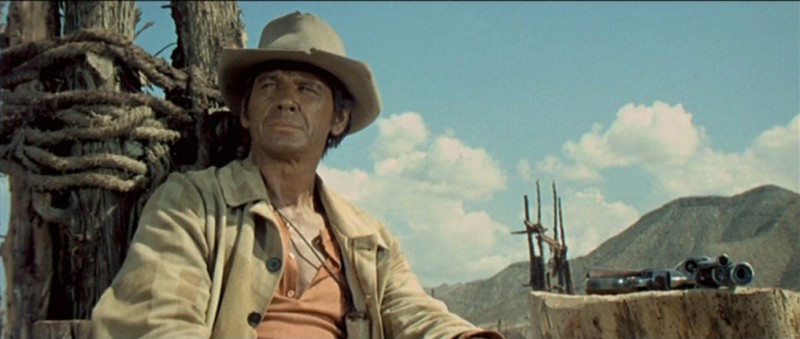
Normally I strive to be elevated in my criticism, preferring the lofty and the urbane to rank obscenities and childish adjectives. Now, however, I must resort to the only words available to me — Once Upon a Time in the West kicks fucking ass! It’s the sort of fuckin’-a good time that leaves me pleased with the world and all of its contents. If you catch me within a few hours of a screening, I just might smile in your direction. You might even hear me say that I’m glad to be alive. Sergio Leone’s 1968 masterpiece (and I use that word with complete and utter confidence) is not only the greatest Western ever made at any time, in any country, by any director, but it also ranks as one of the boldest experiments in all of cinema; a landmark motion picture of unique vision, confidence, stylistic ambition, and operatic madness.
For yes, it is madness — asking that we endure long silences, wordless glares across barren landscapes, and a story that in lesser hands would whip by in 85 minutes, and is instead stretched out to a beautiful, impossibly breathless 165. We are also asked to accept the closest thing to an American Saint in movie history, blue-eyed Henry Fonda — Young Abraham Lincoln himself — as one of the meanest sons-a-bitches to ever grace the silver screen. A man who unapologetically murders an entire family, including a wide-eyed, plucky little redhead, all for cold, hard cash and the satisfaction of having ended a life. After being lectured by the railroad magnate who hired him to perform the deed (“You were only supposed to have scared them!”) he answers, deadly serious and bereft of all human feeling, “People scare a lot easier when they’re dyin’.” If that’s not Ruthless, I don’t know what is.

Above all, Once Upon a Time in the West is a European’s twisted and insanely accurate picture of the American Way, typified by the push Westward — unchecked capital, amoral and relentless, will use any method, including murder, to secure its ends. For many, the railroad ensured prosperity and an expansion of the American Dream (which it did), but in order to finalize that much-needed goal (and only a fool would argue against it), many had to die horribly and exploitation was unavoidable. That isn’t left-wing revisionism; it is simply the truth of history. From cheap labor, to prostitution, to murderous greed, the West was vintage Americana — exactly the sort that could proclaim Americans as “touched by the hand of God” while using their own hands to slit Native American throats, rape Asian women, and shoot innocent children. I can’t imagine an America any other way, and no one is asking you to, either. We’re a barbaric, savage people and it’s about time we claim that label as our own. Sometimes it takes an outsider to hold up the mirror.
But just as much as that, Leone’s film is a Western about Westerns, employing shots, landscapes, and allusions that are a virtual panorama of film history. While listening to the commentary track, I was astounded to hear how frequently Leone borrowed from the masters. From John Ford to Nicholas Ray, Leone is demonstrating that it is impossible to make a great film without tipping one’s hat to those who came before. Only the arrogant and the mediocre try to pass their crap off as wholly original. But while Leone gives us pieces of the past, he transcends his teachers and proudly takes thematic risks that those men would have avoided. True enough, Ford asked questions of himself late in his career, but Leone was one of the few who dared utter in public the belief that the Western is the one true American genre because it reveals the corruption of our very soul. That’s not to say that this movie isn’t entertaining as hell and full of a joyous spirit. Leone loves filmmaking as an art unto itself; he sweeps his camera along, twists us around, and uses some of the most dramatic (and fitting) music ever composed to barrel forward with his tale.

Take the opening credits — nearly ten minutes by my clock — where three hired guns wait at a train depot for an unknown passenger to arrive. The wide screen compositions are as lush and inviting as any I’ve ever seen, and we haven’t yet visited Monument Valley. Leone takes us around the station; from water dripping on a hat, to a pesky fly bothering a napping gunslinger, to a squeaky windmill. In a sense, nothing is happening, yet the tension is almost unbearable. Most of all, we are floored by the audacity. No one speaks and no one does much of anything, yet we know a stranger will be arriving and then, well, who knows? The opening scene is a primer for all that Leone does — and does well — and should be studied at length by all those who believe that fast cuts and blaring action are necessary to thrill an audience. It is telling that Leone cites Akira Kurosawa and Yasujiro Ozu as major influences in that they are all willing to let scenes play as they must without rushing to the next dramatic development.
And then there’s the cast: Fonda, Jason Robards, Charles Bronson, Claudia Cardinale, Woody Strode, Jack Elam, and dozens of character actors with incomparable faces. Perhaps these are “types” in the classic Western sense (the loner seeking revenge, the ex-whore who marries for security only to lose her husband to violence, the millionaire who punishes others to compensate for his crippling paralysis), but Leone never claimed to be working against the rules of the game; only tweeking them a bit to reach a larger purpose. And yes, as I said earlier, it is operatic, and as such must adhere to those conventions as well. But there are no real winners and losers in this fight, and that is what elevates Leone’s work.
I can only close with a sigh of contentment as I remember the style. It could be argued that there has never been another film that is so reliant on style, yet also manages to show us a deeper meanings and leave us with a better understanding. Leone has no problem rubbing our noses in his craft, but for once there is more to it than that, although this is one of the few times I would argue in favor of style alone. I watched with commentary and yet was transfixed by the silent images, and I am sure I could watch with the sound off completely. And then I’d watch it again with the sound on and no picture. Regardless of what one chooses, this is a film that holds rewards on numerous levels and could be watched again and again without a shred of bored familiarity. My only sadness comes from not seeing it on the big screen, although such a privilege might ruin me forever. After that, what could ever really measure up? And would ever have the nerve to try?

Quotes and one-liners:
⦁ Did you bring a horse for me? -Harmonica
⦁ Well…It looks like…It looks like we’re shy one horse. -Snaky
⦁ (Shaking head) You brought two too many. -Harmonica
⦁ Wobbles, how can you trust a man that wears both a belt and suspenders? A Man can’t even trust his own pants. -Frank
⦁ Tell me, was it necessary that you kill all of them? I only told you to scare them! -Morton
⦁ People scare a lot better when they’re dyin’ -Frank
⦁ The future don’t matter to us. Nothing matters now – not the land, not the money, not the woman. I came here to see you, ’cause I know that now you’ll tell me what you’re after. -Frank
⦁ Only at the point of dying. -Harmonica
⦁ Inside the dusters there were 3 men. Inside the men there were 3 bullets. -Harmonica
⦁ Let’s have a good look at you. Hey. Mr. Choo-Choo. It’s easy to find you. Bastard! I don’t have to kill you now. You leave a slime behind you like a snail. Two beautiful shiny rails. -Cheyenne
⦁ You know Wobbles…I’m kinda mad at you. (Beats the Hell out of Wobbles) -Harmonica
⦁ He not only plays, he can shoot, too. -Cheyenne


Leave a Reply